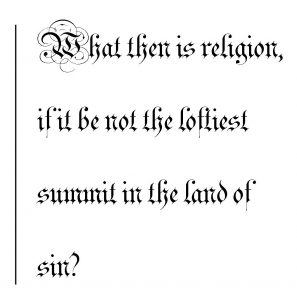Does Religion Cause More Harm than Good?
I bumped into a provocative post as I scrolled through Twitter. A gloating atheist “re-tweeted” an article from the Al Jazeera news network featuring a video of a debate between a scientist and an advocate for religion.
It’s title: “Would We be Better off Without Religion?”
I have my doubts about the people who dangle a question like this in front of people. I doubt that they are innocently curious and searching for answers. There lurks in this headline malicious intent, namely to leave pew-sitters disheartened. Society, until recently, has granted religion and religious people—especially ministers—automatic status as admirable folks. Now this: is our highest value, is the creed we’re trying to pass down to our kids really a part of the world’s problems? Do the achievements of Christian faith outweigh its embarrassments?
It makes me mad. I get combative. I want to argue with such a proposal. I’ve sat for countless hours in seminary classes and worked for 40 years as a pastor. I think of myself as someone equipped with an army of facts, which would overwhelm such a question. Of course, I assume, religion has made the world a better place.
Benefits Verses Drawbacks
I’d taken the bait. My first impulse was to cite America’s hospital system, which I’d heard somewhere was the work of Catholic nuns and Protestant denominations. As it turns out, this isn’t true. But I’m scrounging for evidence. What about the Salvation Army’s work? What about those water wells in Zambia dug by Christian mission workers? I thought that if I spent a few minutes on Google I could would bring up overwhelming evidence that religion is a massive good.
But I began to realize that what I was trying to do was the same thing we did as kids when I would amass my plastic army men against Donnie Johnson’s plastic army men. I’d been drawn into the tit for tat. Do religion’s pluses out-number its minuses?
Do religion’s pluses out-number its minuses?
Does the network of faith-based homeless shelters, on the other hand, offset the stadium-sized crowd of traumatized church refugees on the other? Do millions of glowing faces singing hymns on Sunday morning offset the evil of the Bible-quoting crank who shoots up an abortion clinic? A cold stroke of insight washes over me.
I ‘m not going to shut down the question of religion’s benefit from facts I can retrieve off the top of my head.
Nevertheless, I get a tiny surge of satisfaction when it dawns on me that, because the question of religion’s usefulness is unanswerable, it is also unanswerable by religion’s critics. They can point to faith’s shortcomings all day long. They’ll never prove it’s more evil than good. Every match-up of benefit versus drawback is going to be an “apples vs. oranges” comparison.
I’m calming down now. I’m a little less combative. I haven’t delivered a knockout in the first round. In fact, I’ve got to accept a draw. But that makes me nervous.
What Does the Bible Say?
Does the Bible resolve the question? After 40 years of preaching and teaching from the Bible it has become for me a kind of “old reliable” for orienting my thoughts around difficult questions. As my imagination jumps from section to section of favorite biblical scenes, I can’t fix my thoughts on any single passage or story, which tells me that religion is indispensably a good thing. The Bible doesn’t talk, so far as I can recall, about religion as such. In fact, the Bible barely uses the word, religion. It occurs 5 times (Acts 25:19; Acts 26:5; I Timothy 3:16; James 1:26; James 1:27).
Nevertheless I have an idea. Throughout the Old Testament, Israel’s central religious pillars get knocked over. For example, the Israelite armies had a practice of carrying into battle the Ark of the Covenant, the box that held the Ten Commandments. The Hebrews thought that God sat atop the box, which gave them the ultimate battlefield advantage. Then one day the Philistines captured the box. What was especially disorienting about losing the ark was that Israel suspected that God allowed it to happen.
It wouldn’t be an overstatement to say that everything sacred for Israel is destroyed over the course of its history. Marauding Assyrians stampede 10 of the 12 tribes off their land necessitating that they blend into neighboring societies. In a stroke, Babylon wrecks Jerusalem, the Temple, the monarchy, and what remains of the people—old Abraham’s clan who thought they were God’s favorites. An anti-faith fanatic could not cook up a more devastating assault on religion.
I got this idea from the theologian Harvey Cox who said, and I’m summarizing in my words, that there is a secularizing trend that threads through the Bible. I googled secular’s definition: “…Denoting attitudes, activities, or other things that have no religious or spiritual basis.” In other words, there is a mega-move threading through the Old Testament away from enchantment towards justice; away from spookiness towards conversational intimacy with God.
I know that I haven’t defended religion’s honor with these observations, which I willingly admit are highly selective. I know also that I haven’t directly addressed the question at hand, namely is religion more bad or more good. I may have just scored a point for the other guys by bringing up examples where religious practice is criticized harshly in the Bible and is occasionally is in the crosshairs of an angry God. I feel I’m in a tangle here.
How About the Theologians?
What about theology? Again to Google. “Theology is the critical study of the nature of the divine. It is taught as an academic discipline, typically in universities, seminaries, and schools of divinity.” Well, if you want to consult a theologian you could do no better than Karl Barth, Born in Switzerland back in the 1800’s, Karl Barth enjoys a reputation of being the most influential theologian of the 20th century. As a young scholar, Karl Barth’s created an international stir with an early book, The Epistle to the Romans, which is a loose commentary on the Apostle Paul’s letter, Romans.
When I was 18, I pulled Barth’s Epistle to the Romans, off a library shelf, thinking that it would give me some inspiring nuggets to use in a rag tag Bible study group that met in my dorm room. I sat in a hushed study area, turning the pages of the 20th century’s greatest theologian. I’d never contemplated such electrifying ways to think about my faith. No Sunday school teacher would dare breathe such thoughts in her students’ hearing. Reading Barth as a new Christian was like ordering a beer and actually getting one from the bartender.

What was I learning in that quiet library? I’ll try to give a small taste. Most Christians know that Paul’s letter to the Church in Rome lays out the principle that people are accepted by God, not through “works of the law,” but through the grace of God. God’s grace is truly amazing and always has a stunning impact on a person when he or she accepts its power in his or her own life. Now, Barth takes the world-changing idea of grace-not-works and supercharges it by substituting for works…religion. One sentence, deep in the Epistle to the Romans so jumped off the page for me that I wrote it down and can recite it by memory, now a half century later: “What then is religion, if it be not the loftiest summit in the land of sin, if it be not identical with sin?” (Epistle to the Romans p. 242).
Ever since those days in the library before my 20th birthday, I’ve viewed religion as a human creation. Sometimes it’s sublime and sometimes demonic. The encounter with Christ, on the other hand, is God-initiated. It outstrips anything people could concoct. We can appreciate religion at its best, but we dare not get stuck there.
I realize that what I’ve written here about religion hasn’t acquitted it of the accusation that it is harmful. In fact, this reflection has probably entangled religious faith in even more skepticism. My swaggering thought that I could shut down with a laugh the insinuation that religion causes more harm than good, was far from the truth.
The New Heaven and the New Earth
But one more little verse popped up in my thoughts. It’s so simple. It is Revelation 21.22, deep in the description of End Times. These verses describe the New Heaven coming down and merging with the New Earth. The verse reads:
“I saw no temple in the city, for its temple is the Lord God the Almighty and the Lamb.”
Now, I’m letting “temple” equal religion. In God’s presence no mediation is necessary.
These few words bring a big “ah ha.” Religion is temporary. At its best, religious practice is the scaffolding that props up our relationship with God. Religion gets us by until that great day when we behold God face to face. God’s project isn’t to build a new religion. In turn, it is not our task to see religion as the point of our…well…religion. One line of Revelation’s text opens a broad new vista on the whole question of religion.

Imagine
As I wrote this, the lyrics of John Lennon’s song, Imagine, replayed in my thoughts. I’ve always liked the song and love the feeling of unity that wells up every New Year’s Eve in NYC’s Time’s Square when the shivering revelers sing it together at midnight. Why does Imagine so perfectly capture the optimism of the start of a new calendar year? Of course, as a minister, I’m not supposed to like the John Lennon’s song. After all, it proposes “no heaven and no religion” as part of humanity’s dream for the world to come. Yet, and with exquisite irony, St. John on Patmos and John Lennon just might be dreaming the same dream.
ImagineImagine there’s no heaven
It’s easy if you try
No hell below us
Above us only sky
Imagine all the people living for todayImagine there’s no countries
It isn’t hard to do
Nothing to kill or die for
And no religion too
Imagine all the people living life in peace, youYou may say I’m a dreamer
But I’m not the only one
I hope some day you’ll join us
And the world will be as oneImagine no possessions
I wonder if you can
No need for greed or hunger
A brotherhood of man
Imagine all the people sharing all the world, youYou may say I’m a dreamer
But I’m not the only one
I hope some day you’ll join us
And the world will be as oneSongwriters: John Winston Lennon
Imagine lyrics © Downtown Music Publishing
